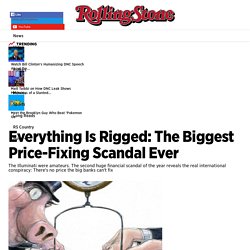

The Impossible Hamster Club. The Myth of Infinite Growth. Hidden Secrets Of Money. 140 Years Of Monetary History In 10 Minutes. The Biggest Price-Fixing Scandal Ever. Conspiracy theorists of the world, believers in the hidden hands of the Rothschilds and the Masons and the Illuminati, we skeptics owe you an apology.

You were right. The players may be a little different, but your basic premise is correct: The world is a rigged game. Money in Politics. Monetary system documentaries. Gangster Bankers: Too Big to Jail. Flip The Debt. The capitalist network that runs the world - physics-math - 19 October 2011. AS PROTESTS against financial power sweep the world this week, science may have confirmed the protesters' worst fears.

An analysis of the relationships between 43,000 transnational corporations has identified a relatively small group of companies, mainly banks, with disproportionate power over the global economy. The study's assumptions have attracted some criticism, but complex systems analysts contacted by New Scientist say it is a unique effort to untangle control in the global economy. Pushing the analysis further, they say, could help to identify ways of making global capitalism more stable. The idea that a few bankers control a large chunk of the global economy might not seem like news to New York's Occupy Wall Street movement and protesters elsewhere (see photo). But the study, by a trio of complex systems theorists at the Swiss Federal Institute of Technology in Zurich, is the first to go beyond ideology to empirically identify such a network of power. Demonocracy.info - Economic Infographics.